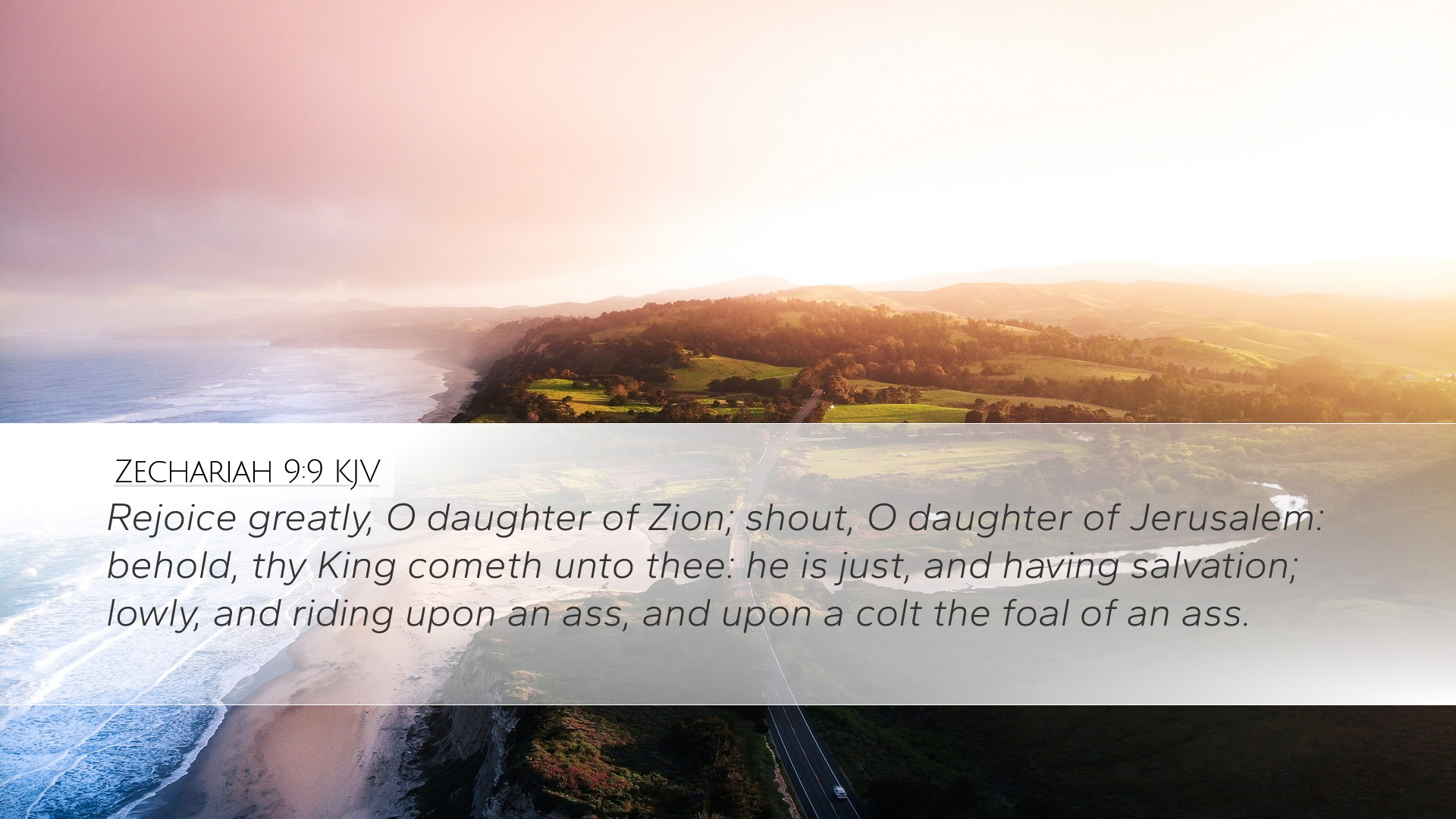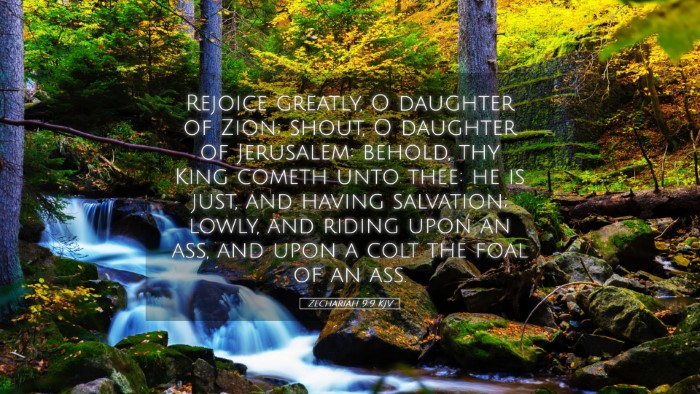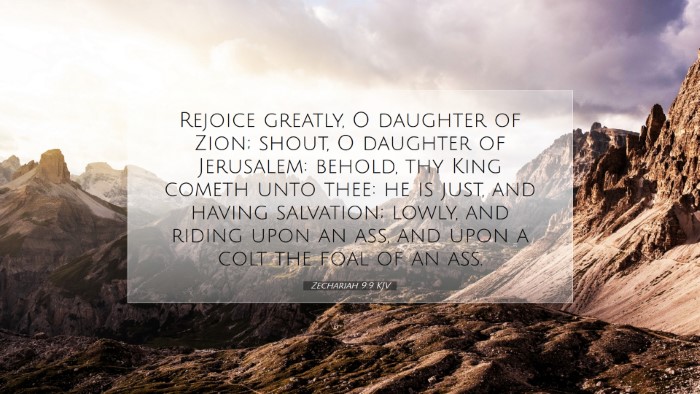Old Testament
Genesis Exodus Leviticus Numbers Deuteronomy Joshua Judges Ruth 1 Samuel 2 Samuel 1 Kings 2 Kings 1 Chronicles 2 Chronicles Ezra Nehemiah Esther Job Psalms Proverbs Ecclesiastes Song of Solomon Isaiah Jeremiah Lamentations Ezekiel Daniel Hosea Joel Amos Obadiah Jonah Micah Nahum Habakkuk Zephaniah Haggai Zechariah MalachiZechariah 9:9
Zechariah 9:9 KJV
Rejoice greatly, O daughter of Zion; shout, O daughter of Jerusalem: behold, thy King cometh unto thee: he is just, and having salvation; lowly, and riding upon an ass, and upon a colt the foal of an ass.
Zechariah 9:9 Bible Commentary
Commentary on Zechariah 9:9
Zechariah 9:9 (ESV): "Rejoice greatly, O daughter of Zion! Shout aloud, O daughter of Jerusalem! Behold, your king is coming to you; righteous and having salvation is he, humble and mounted on a donkey, on a colt, the foal of a donkey."
Introduction
Zechariah 9:9 presents a profound and messianic prophecy regarding the coming of the King to Zion. This verse encapsulates the joy and anticipation of His arrival, emphasizing His righteousness, salvation, and humility. The significance of this prophecy is critical for understanding the character of Christ and His mission. Below, we draw insights from respected public domain commentaries to explore the depth of this verse.
Exegesis of the Verse
The prophet begins with an exhortation to rejoice—“Rejoice greatly, O daughter of Zion”—which calls the people to celebrate the arrival of their King. The term "daughter of Zion" metaphorically speaks of Jerusalem and, by extension, Israel, highlighting the intimate relationship between the city and its people.
Exalting the King
The verse commands the people to "shout aloud," portraying a scene of unrestrained joy and anticipation. As noted by Matthew Henry, this exuberance is not merely a reaction but a divine directive reflecting the significance of the King’s coming. Their shouts signify acknowledging a transformative moment in their national history.
The King’s Character
The passage describes the King as "righteous and having salvation." This duality speaks to His role as both just and redemptive. Albert Barnes emphasizes that the righteousness of Christ underlines His ability to save, indicating that He is not only kingly but has the right to exercise authority because of His justice and impartiality. The anticipation of salvation evokes an image of deep hope in a time of despair, suggesting that this King will restore peace and righteousness.
Humility and Servanthood
A pivotal part of this prophecy is the King’s mode of entry—"humble and mounted on a donkey." Adam Clarke elucidates that the choice of a donkey contrasts sharply with a royal horse, which denotes war and conquest. A donkey signifies peace and humility, indicating that the nature of Christ's reign is different from worldly rulers who wield power through might. This is also prophetic of Christ's actual entrance into Jerusalem, fulfilling this promise during the Triumphal Entry as noted in the Gospels.
Messianic Interpretation
The fulfillment of this prophecy in the New Testament illustrates its messianic significance. Zechariah 9:9 is cited in the Gospels (e.g., Matthew 21:5) to affirm Jesus' identity as the awaited Messiah. The crowds’ reference to Jesus as the "Son of David" during His entry reaffirms the expectations set by this prophecy.
Theological Implications
Henry posits that this prophecy illustrates God's faithfulness in fulfilling His promises—a theme that resonates profoundly in the theology of hope. The arrival of Jesus as the King invites theological reflection on the nature of God's kingdom which transcends human expectation.
Application for Today
For contemporary believers, this verse serves as a reminder of the celebration due to Jesus's coming and His ongoing presence in our lives. The call to rejoice is timeless, inviting reflection on our posture toward Christ’s kingship. Are we recognizing Christ as our humble King and responding with joy? Barnes encourages believers to assess their attitudes toward hypocrisy in worship, urging a genuine response that aligns with the truth of Christ’s character.
Conclusion
Zechariah 9:9 presents a rich tapestry of hope, humility, and royal authority woven into the prophetic fabric of the Old Testament. Engaging with this verse provides critical insights for pastors, theologians, and students of the Bible, encouraging deeper contemplation regarding the nature of Christ’s kingship and His transformative power in our lives. As we reflect on this verse, let us embody the joy and reverence it calls for, celebrating the profound truth of our humble King who comes to bring salvation.


